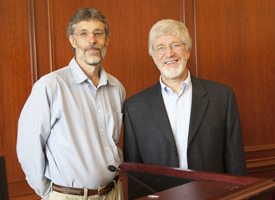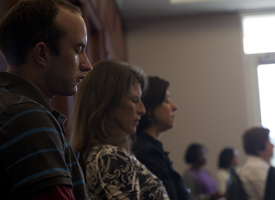Counseling Students and Professionals Learn the Importance of Mindfulness
News How mindful are you of your actions in the workplace? What about with children or coworkers? Counseling professionals and graduate students congregated in the Montpelier Room of the East Campus Dining Hall on September 16 for a workshop showcasing the importance of mindfulness in counseling practices and everyday life. Joe Klein, M.S. and Alan Forrest, Ed.D. of Radford University led the event. Klein is an adjunct faculty member, and Forrest is a professor; both are Licensed Counseling Professionals (LCPs). Their lessons demonstrate how to engage child and adolescent counseling clients in positive ways.
How mindful are you of your actions in the workplace? What about with children or coworkers? Counseling professionals and graduate students congregated in the Montpelier Room of the East Campus Dining Hall on September 16 for a workshop showcasing the importance of mindfulness in counseling practices and everyday life. Joe Klein, M.S. and Alan Forrest, Ed.D. of Radford University led the event. Klein is an adjunct faculty member, and Forrest is a professor; both are Licensed Counseling Professionals (LCPs). Their lessons demonstrate how to engage child and adolescent counseling clients in positive ways.
The form of mindfulness that was covered at the workshop has a different meaning than the normal dictionary definition of being aware and careful of your actions and words. This type of mindfulness was defined as, "paying attention in a particular way, on purpose, in the present moment, and nonjudgmentally." Forrest and Klein cited Jon Kabat-Zinn's definition of mindfulness in their presentation.
During the workshop, the participants learned about trauma history and how it shapes one's emotional regulation. The workshop also included presentations on the brain's development, function, and its triggers. In between presentations, the participants were involved in experiential exercises that got everyone up and moving. "It was a very experiential workshop meaning that the audience was asked to help in creating a safe space where we could all experience mindfulness activities," explained JMU professor Dr. Tammy Gilligan, "The audience felt safe and participated in ways that were [comfortable] for them."
"By participating in such activities ourselves we will likely be more effective when assisting others, as our own interfering thoughts are fully understood," explained school psychology graduate student Emily Smithson. "The workshop provided an opportunity for us to draw attention to ourselves through various activities, so we as individuals in the helping profession are better able to aid others."
 "When we practice non-judgmental awareness and attentions, we have more of a receptive attitude and approach and can carry that into our time with kids," said JMU professor, Dr. Tammy Gilligan. "We are practicing mindfulness, and we can teach these children and adolescents [mindfulness]." Children are naturally very mindful; they live in the moment with their shorter attention spans. They constantly express their thoughts and feelings through words and gestures.
"When we practice non-judgmental awareness and attentions, we have more of a receptive attitude and approach and can carry that into our time with kids," said JMU professor, Dr. Tammy Gilligan. "We are practicing mindfulness, and we can teach these children and adolescents [mindfulness]." Children are naturally very mindful; they live in the moment with their shorter attention spans. They constantly express their thoughts and feelings through words and gestures.
Mindfulness practices can be found in Buddhism, Taoism and yoga. Great minds such as Ralph Waldo Emerson, Henry David Thoreau, Walt Whitman, Aboriginal peoples and Native American elders were said to have also practiced non-judgmental awareness according to the workshop.
Attendance was comprised of graduate students, professionals and professors of four disciplines; school counseling, school psychology, community counseling and clinical psychology.
Dr. Gilligan emphasized how important the cross-disciplinary aspect of these workshops, "The cross-discipline approach is really unique to experience with different professionals that may be thinking about it a little differently than you."
Smithson added, "It was an experience that highlighted and reminded professionals and professionals-in-training the importance of awareness."

